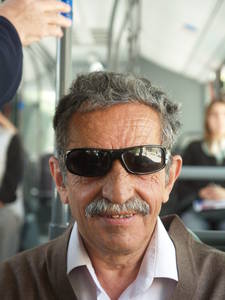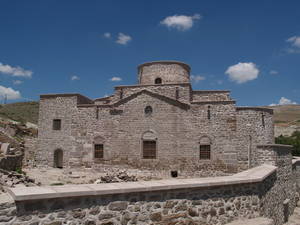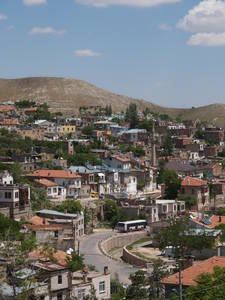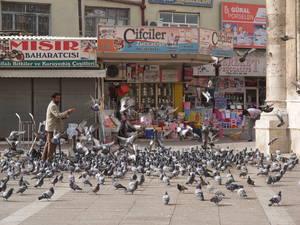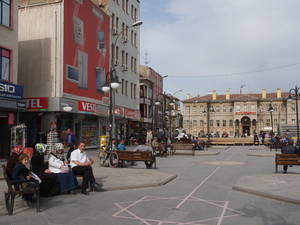Konya
In Konya we stayed in the three star Hotel Rumi. This was the biggest
place we stayed in on the trip, and the only one with staff in uniform,
but not the most expensive (Istanbul and Ankara were more expensive).
Strangely, it was the only place I had trouble getting the wireless
Internet access to work, though after some fiddling with the DHCP settings
it did.
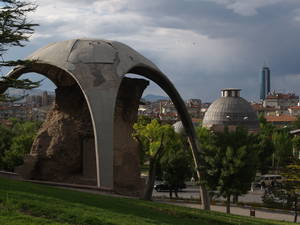
Konya old and new, from Alaadin's Hill: a 25 year old protective shield over Byzantine walls, the Karakoy Tile Museum (a Seljuk medrese), and Konya's one real skyscraper
In the evening we wandered down Mevlana Caddesi to Alaadin's Hill.
Outside the mosque at the top we met Sabri, a retired government
economic/commercial director who spends his days talking to tourists.
We had tea with him and then he took us somewhere Gabi and he could have
a beer. This is not so easy in Konya, where the local government is
anti-alcohol — our hotel "mini-bar" has nothing stronger than coca-cola
in it! He gave us good advice on what to see and was fun to talk to,
so we arranged to meet up with him again the next day for a trip out to Sille.
On the way back to the hotel we ran into a rug salesman, who spoke good
English and managed to get us into his shop and Gabi as far as asking
how much a small rug was... But we managed to escape with just his
business card. He also pointed us towards a good place to get dinner,
where I had one of the local specialities, firin kebap, which consists
of very soft, nicely fatty lamb with a kind of local bread.
Wednesday 26th May
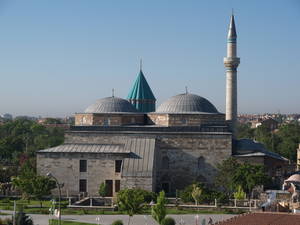
the Mevlana Museum, from the Rumi Hotel
We started the morning visiting the Mevlana Museum, which is where Mevlana
Rumi is buried. This is the biggest attraction in Konya, bringing both
tourists and worshippers, and it was quite crowded. There are displays
of artifacts related to Rumi and the Mevlevi dervish order he founded,
but these seem to have been bulked out by fairly random donations,
with a lot of rugs and illustrated Korans.
After that we walked down Mevlana Caddesi to the Karatay Tile Museum,
which is small but has a nice display of Seljuk ceramics and tiles in a
restored building which is itself lovely (it was one of the medrese in
which Rumi taught). We did a quick pass by the lovely carvings on the
front of the Ince Minaret Medrese, and then climbed up to the Alaadin
Mosque to meet Sabri.
The three of us caught a bus up to Selle, a village up in the hills
which used to be Greek. There's a lovely little Byzantine church here,
supposedly built in the 4th century by Constantine's mother Helena.
It was closed for renovations, unfortunately, but the outside was quite
striking and not like any other church I've seen. There are also some
old cave houses in Sille, and it's quite a pretty village. (There are
newer buildings down the hill, including a posh private English-medium
high school.)
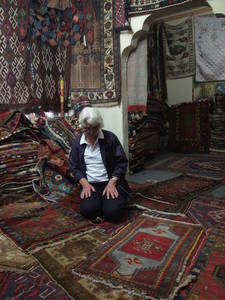
Gabi in the rug shop
Back in Konya, Sabri took us to a rug shop, which turned out to be the
same one we'd visited the previous night. There the rug Gabi had decided
to buy turned into three rugs, with an adroit sales pitch from Nazif,
and I picked up one myself. This ended up involving a taxi trip with
all four of us out to a little TNT office in the suburbs to post our
purchases to the UK.
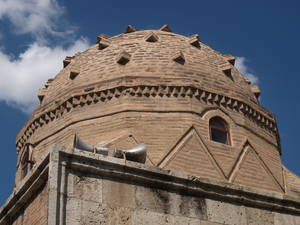
a small mosque
Sabri then took us a to a quiet kebap place where we got to try the other
Konya speciality,
etli ekmet. This is very similar to kiymali
pide, but done on a flat and slightly crunchy bread rather than on pide.
Then we did the tour of the assorted museums south of Alaadin's Hill,
which have some interesting items but aren't particularly notable.
(We skipped the Archaeology Museum, since everything of note is apparently
in the museum in Ankara, if not in Berlin, Paris, or London.)
Then I had a shave in a barber shop — a full-on experience! —
while Gabi went to the rug shop to listen to Nazif's father playing music.
When I met Nazif on the street outside I asked him if Gabi had bought
any more rugs, and he said "no, but I think she will buy one more",
and lo and behold he managed to sell her another one while I looked on
and admired his technique.
Konya is supposed to be
Turkey's most conservative city, but the town
centre in the evening was one of the more fashionable places we saw in
Turkey. There were certainly more women wearing headscarves than in Selcuk
or Bergama, but full burkas were less common than they are in East Oxford.
The headscarves
are brightly coloured and while the older women favour the long
shapeless "manteau" the younger ones tend to fitted jackets, dresses,
jeans, heels, and even makeup.
There were also plenty of women without
any kind of headcovering, some of them dressed quite nicely. I even saw
one woman in something approaching a minidress — though I also noticed
that she was literally turning heads, with the men walking past swivelling
to follow her. It was more conservative when we went out of the centre,
but overall Konya seemed less religious than the Old
City area of Istanbul we were in at the beginning of the trip. In any
event, if this is Turkey's "Koran Belt", it's more like Sydney having a
"Bible Belt", not anything remotely like Iran or Saudi Arabia. (I think
eastern Turkey is actually the most conservative part of the country.)
Sabri was a CHD supporter - a party activist as a student - so pretty
scathing about the wearing of headscarves. He was a mine of information
about Konya and Turkey and the details of his own life were fascinating.
(He had worked as some kind of director of commercial enterprise, who was
rotated between provinces every three years to try to reduce corruption.)
If you're ever visiting Konya and want a guide, just visit Alaadin's Mosque
and look out for a friendly older man with a few missing teeth.
Thursday 27th May
We had booked an 11 o'clock bus to Goreme, so we had an hour or more after
breakfast to wander the streets before catching a taxi to the bus station.
One of the men at reception quite openly moonlights as a private taxi
driver — he told us that he only earns 600 lira a month at the
hotel and that with two children, one of them starting primary school,
that wasn't enough.
Next: Goreme: Open Air Museum
Previous: Beysehir
Up: Turkey


